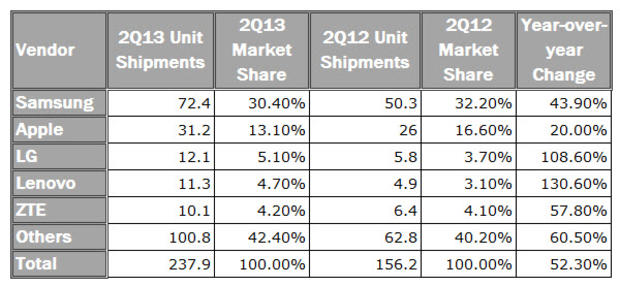Why Apple, Samsung lost share in a hot quarter
(MoneyWatch) Apple (AAPL) posted a record quarter for iPhone unit sales for the April through June period. It represented a
Apple wasn't alone, however. The same thing happened to Samsung: a nearly 44 percent year-over-year increase in smartphone unit sales and yet a drop from 32.2 percent to 30.4 percent global market share. Sounds contradictory, right? It isn't. Communications in the world are changing, and so are the people's buying habits. They increasingly want smartphones that allow them to connect to others via voice, text, e-mail, social media sites, the Web, television and music. Global smartphone sales for the quarter were up 52.3 percent, "the highest annual growth rate in five quarters." And that very demand is having a major impact on vendors, as price matters more and more.
- Apple's growing problem: Shrinking profit margins
- Apple posts strong numbers but iPhone a problem
- Are people 'over' smartphones?
- Cheaper mobile is coming -- at a price
- One reason TV has to change: Mobile
As smartphone use continues its expansion, the market comes to include many people who aren't in the relatively well-heeled early adopter set. Many around the world are far more price sensitive than, say, Apple or Samsung or Google (GOOG) fanboys in North America. A number of companies, generally associated with mid- to lower-priced devices, "experienced torrid shipment growth," and there is some evidence they are gaining market share, according to IDC. Below is a table of IDC-reported data on top smartphone vendors, unit shipments (in millions) and market share for the second quarter of 2013.
Although IDC does say that while there is still market opportunity at the high end, there is increasing pressure on the lower end. However, phones with low prices still must provide "premium devices and services." As Apple has found with its significantly dropping margins on iPhones, many people will gravitate toward cheaper devices if they perceive that they still get full features.
The term "full features" only continues to widen in meaning as products like the new Chromecast from Google potentially turns smartphones into video-streaming sources for televisions. But, as Chromecast shows, the added features can come from third parties and not depend on premium products with premium prices from Apple or Samsung.
Such carriers as T-Mobile and Verizon are already embracing service options that don't include traditional device subsidies. When the price is clearly visible, people may become more conservative.
The future ultimately will belong to less expensive smartphones that do everything people want them to do. Sure, there will still be premium products like the iPhone or Galaxy S 4 for people who want a certain cachet, but pricing pressure is on the market leaders, and their investors, who have come to expect a world of high-margin returns.
